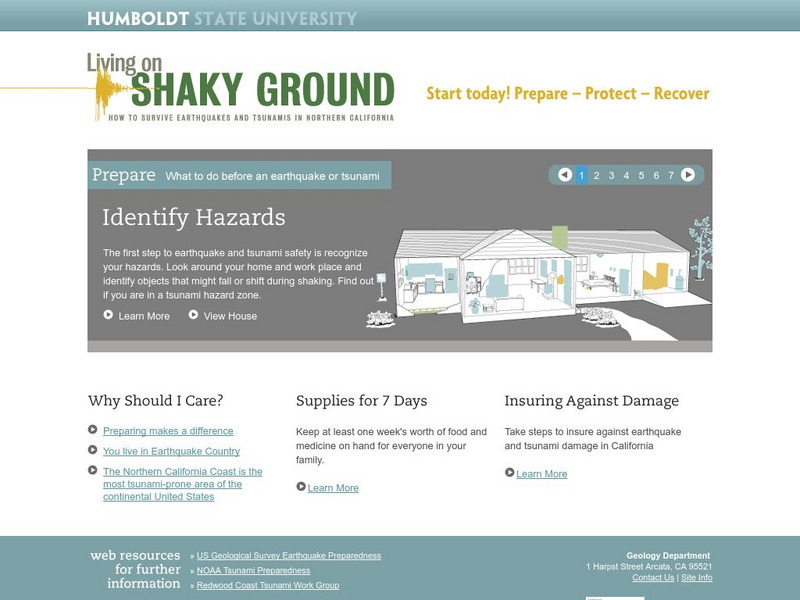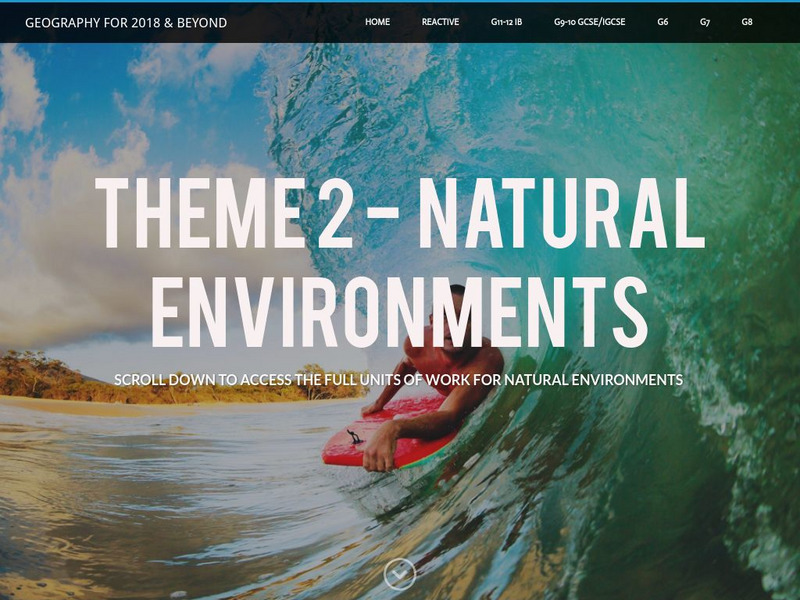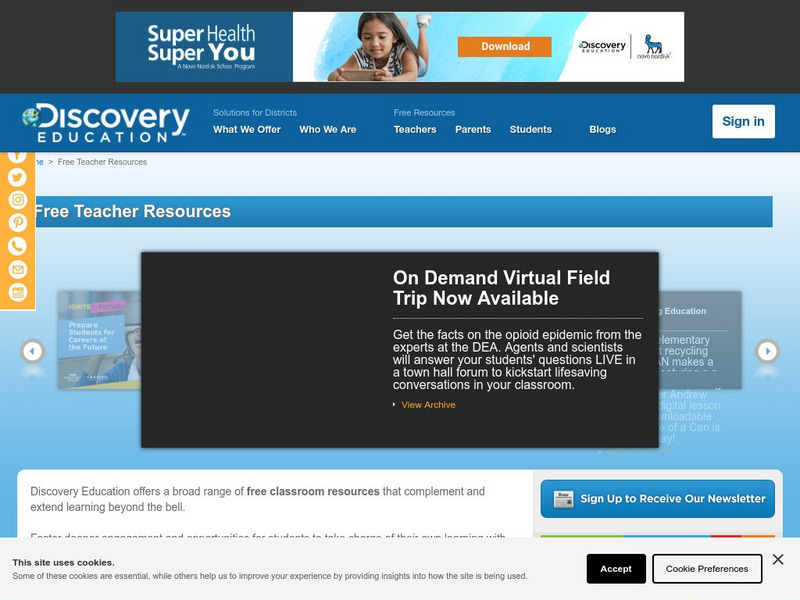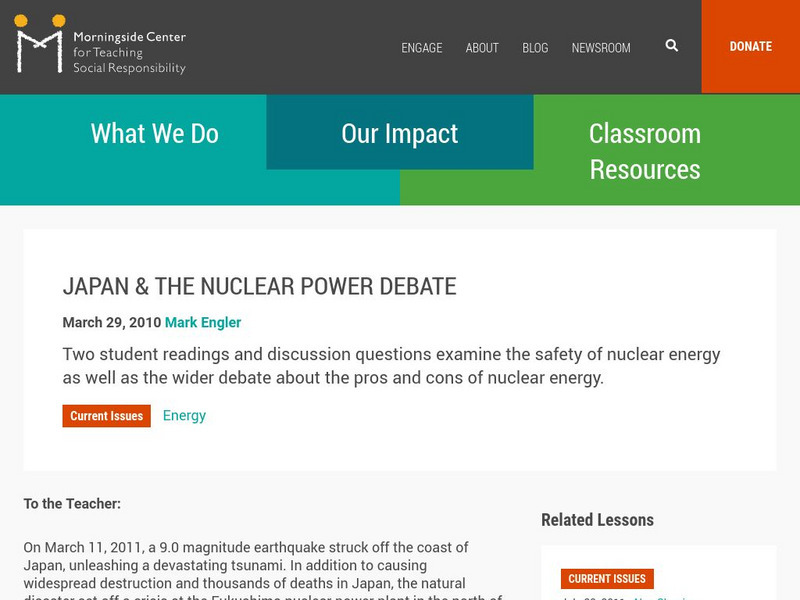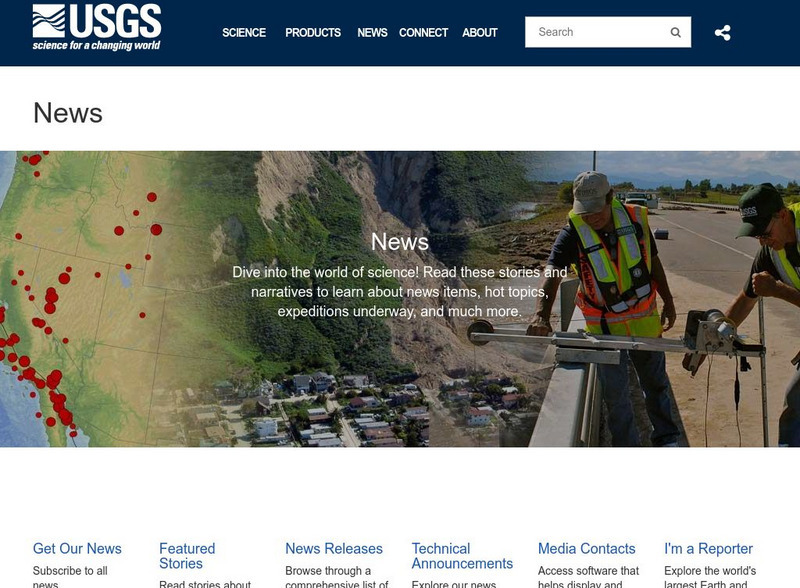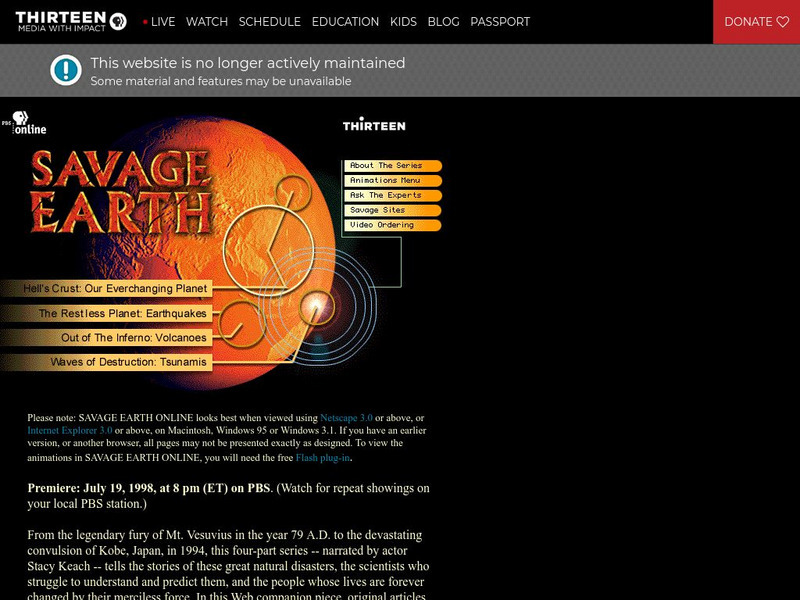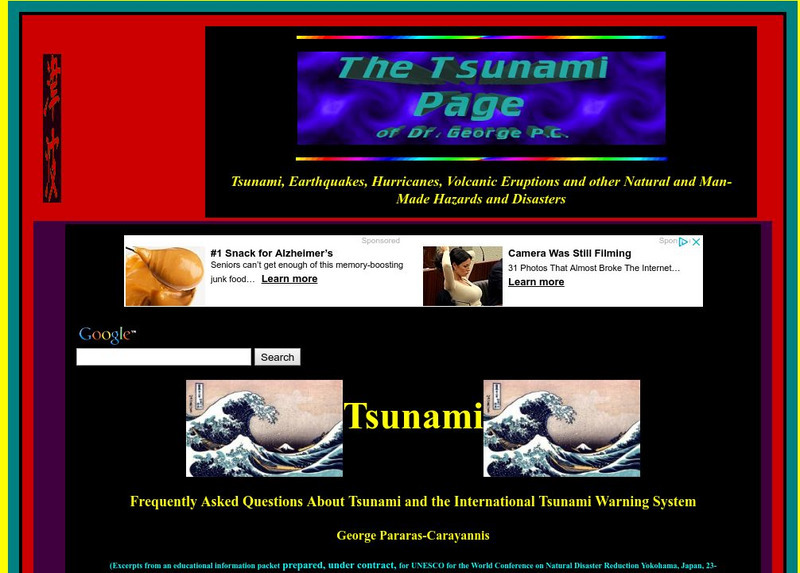Other
Humboldt State University: Living on Shaky Ground: How to Survive Earthquakes
Actions to take that increase safety in the event of an earthquake or tsunami. Website covers identifying hazards in the home, creating a disaster plan, protecting yourself during an earthquake, checking for injuries and damage, and...
NOAA
Noaa: March 11, 2011 Honshu Tsunami
Facts, figures, and a graphic display of the Honshu tsunami that was generated by a Mw 8.9 earthquake on March 11, 2011.
NOAA
Noaa: National Weather Service: Jetstream: Tsunamis
Online school for weather presents an abundance of information about tsunamis. Explore how they form, where they occur, how to prepare for one, and how to survive one. A review quiz and lesson plans are included for further enhancement...
Geographypods
Geographypods: Theme 2: Natural Environments
A rich collection of highly engaging learning modules on topics related to the natural environment. Covers four main areas - plate tectonics, forms and processes, weather and climate, and rainforest and desert. Within each of these,...
Other
Abc News: Talking to Kids About the Tsunami Tragedy
How can you begin to talk to your kids about the Tsunami tragedy? This site offers insight on how to deal with this difficult topic.
Other
K 3 Learning Pages: Tsunami Disaster
This site features several links to tsunami relief sites. Students and teachers can access information about the tsunami relief efforts through these resources.
US Geological Survey
U.s. Geological Survey: Magnitude 9.0 Near the East Coast of Honshu, Japan
Facts and figures on the earthquake and tsunami in Japan in March, 2011. Be sure to click on the tabs across the top that provide: summary, maps, scientific and technical information, as well as information on the tsunami.
Other
University of Wisconsin Green Bay: Faults and Earthquakes
This site is primarily set up as an outline and is loaded with graphs, maps, and images. It covers a variety of earthquake-related topics, such as what causes earthquakes, fault lines and structures, seismology, a historical look at...
Discovery Education
Discovery Education: Dynamic Earth, Tsunami
Use this site to teach your learners what a tidal wave or tsunami is from this lesson plan. The discovery activity shows how a tsunami happens.
TeachEngineering
Teach Engineering: Tsunami Attack!
Students learn about tsunamis, discovering what causes them and what makes them so dangerous. They learn that engineers design detection and warning equipment, as well as structures that that can survive the strong wave forces. In a...
PBS
Pbs News Hour Extra: Preparing for the Ongoing Impact of Tsunamis and Earthquakes
Using geologist's tools and the lessons from the historic Japan earthquake of 2011, students predict when a disaster will hit and the need for disaster preparedness in communities.
Weather Wiz Kids
Weather Wiz Kids: Earthquakes
Fun FAQs on earthquakes, their causes earthquakes, the Richter scale, and earthquake safety tips. Site includes videos, animations, and links to related material. Excellent for student exploration. (Click on "Earthquakes" on left hand...
Other
Teaching Social Responsibility: Teachable Moment: Japan's Nuclear Power Debate
Readings and news articles provide information on the debate over nuclear energy. In particular, the questions being raised due to the crisis in Japan after the earthquake and tsunami in March, 2011.
PBS
Wave That Shook the World
This resource focuses on the December 26th Indian Ocean tsunami. It explains the anatomy of the Indian Ocean tsunami, as well as what is being done to prepare for future tsunamis. In addition, it shows potential hot spots for future...
PBS
Pbs Teachers: Science of Tsunamis: Seeking Understanding in the Wake of Tragedy
Conduct a demonstration to learn about how waves function in water. Create a poster that shows the physics of waves, how tsunamis work, the devastation caused by the 2004 tsunami or information about relief efforts for the 2004 tsunami.
Science4Fun
Science4 Fun: Tsunamis
Learn the causes of tsunamis, what happens during one, where they appear, and survival tips.
Other
International Inst. Of Seismology and Earthquake Engineering: Tohoku Earthquake
Technical information on the earthquake of March 22, 2011, consists of facts about the mainshock, tsunami simulation, and determination of earthquake magnitudes.
University of Washington
University of Washington: 1964 Alaskan Earthquake
Alaska is part of the Pacific Ring where there are many earthquakes. Basic information about the 1964 Alaskan earthquake is provided, including landslides and liquefaction information, an embedded link to the text of a radio announcement...
BBC
Bbc: Cbbc Newsround: Asia Earthquake Disaster
Diaries, pictures, guides, quizzes, and news about the Asian tsunami one year after it hit.
US Geological Survey
Usgs: 2004 Deadliest in Nearly 500 Years for Earthquakes
The USGS provides the facts and figures on 2004's earthquakes, which is the second most fatal in recorded history.
Open Ed
Open Ed Sci: 6.5 Natural Hazards
This unit begins with students experiencing, through text and video, the 2011 Great Sendai or Tohoku earthquake and subsequent tsunami that caused major loss of life and property in Japan. Students will think about ways to detect...
PBS
Wnet: Thirteen: Savage Earth Online
PBS produced "Savage Earth," a television series about volcanoes, earthquakes, and tsunamis. Contains extensive information with great graphics.
Other
Disaster Pages: The Tsunami Page
FAQs about tsunamis address the reasons they occur and the destruction they cause. Also, learn about systems in place that provide Tsunami warnings as well as the data collected by scientists studying violent earthquakes and seismic sea...
Other
Ceri: Earthquake Facts and Follies
A list of frequently asked questions about earthquakes. This is a good source for earthquake trivia and separating fact from fiction.


